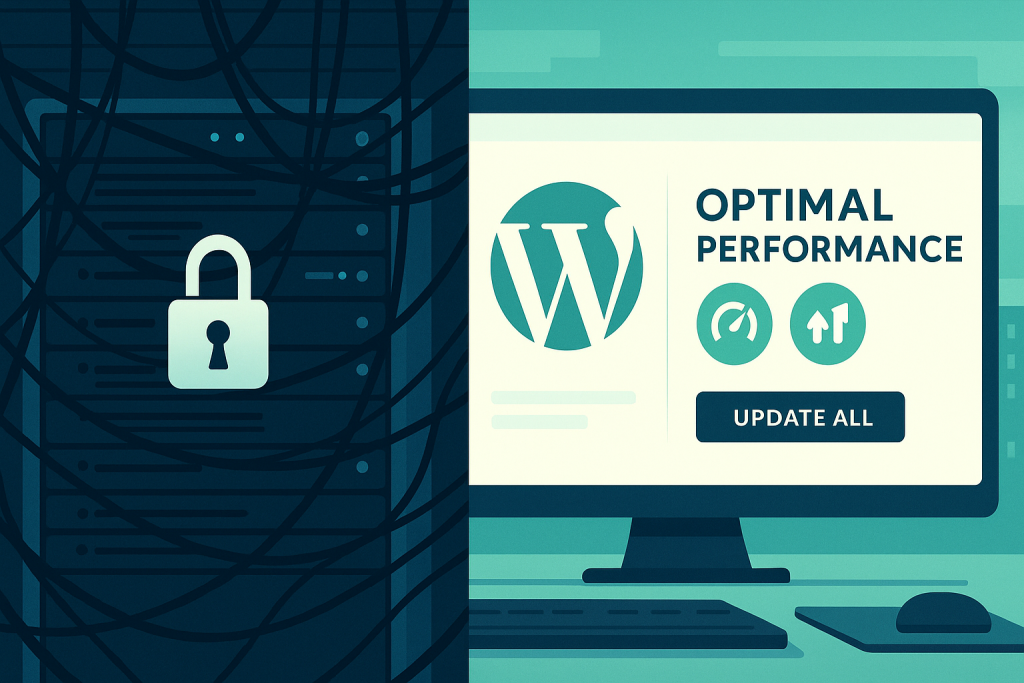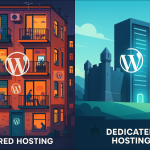The Confusion at the Crossroads
When you decide to launch a website, you quickly learn you need a “host.” A host is simply the company that rents you space on their server (a powerful computer) so your website files can live there and be accessible to anyone in the world.
But that’s where the simplicity ends and the confusion begins.
You see a long list of choices: Shared Hosting, VPS Hosting, Cloud Hosting, Dedicated Hosting… and then, a special category: WordPress Hosting.
If you’re building a site with WordPress—which over 43% of the internet does—you might wonder: If I’m using WordPress, why wouldn’t I just use regular Web Hosting? Is WordPress Hosting really different, or is it just a clever marketing trick?
The answer is: It is absolutely, fundamentally different, and choosing the wrong one can cost you time, performance, and money.
This isn’t a surface-level comparison. This is the definitive, deep-dive guide for every new, growing, and established WordPress site owner who needs to understand the engine under the hood.
We are going to break down the technical differences and show you exactly what to choose based on your budget, technical skill, and future goals.
Part 1: Defining the Two Titans
Before we start the fight, let’s get crystal clear on what each term means.
1. What is Web Hosting (The Jack-of-All-Trades)?
Web Hosting is the big, umbrella term. It refers to the service of storing and serving any website, regardless of how it was built. Think of it as a massive, versatile piece of land.
- Technology Agnostic: A generic web server is configured to handle many different things: a website built with HTML/CSS, an application built on Python, a store running on Joomla or Drupal, or, yes, a website running on WordPress.
- A “Bare Bones” Deal: When you sign up for a basic Web Hosting plan (most often Shared Hosting), you are renting a basic, multi-purpose space. You get a server, a database, and a control panel (like cPanel). It’s up to you to choose the platform, install it, configure the settings for speed, and manage all the ongoing maintenance.
- The Hosting Types Under This Umbrella:
- Shared Hosting: You share a server with potentially hundreds of other websites. (Cheapest, most common, least powerful).
- VPS (Virtual Private Server): A dedicated, partitioned slice of a server. (More power, more technical knowledge required).
- Dedicated Hosting: You rent an entire physical server. (Maximum power, maximum control, most expensive).
2. What is WordPress Hosting (The Specialist)?
WordPress Hosting is a specific type of Web Hosting that has been intentionally configured, optimized, and dedicated only to running WordPress websites. Think of it not just as land, but as a purpose-built racetrack for a specific high-performance car.
It is always a form of Managed Hosting, which means the host takes on a huge amount of the technical burden for you.
- Technology Optimized: The server software (like PHP, MySQL, and caching layers) is fine-tuned to meet WordPress’s exact requirements. This optimization is impossible on a generic shared server because those servers must balance the needs of dozens of different software platforms.
- The “Concierge” Service: The core value is not the server space itself, but the management that comes with it. The host’s systems are designed to monitor, update, and protect a WordPress site specifically.
- Types of WordPress Hosting:
- Shared WordPress Hosting: This is essentially basic Shared Hosting with a one-click WordPress installer, but with some specific WordPress optimizations (like LiteSpeed or basic caching). It’s a step up from generic shared hosting, but still resource-limited.
- Managed WordPress Hosting: This is the premium, specialized product. It often runs on Cloud or high-performance VPS infrastructure and includes a comprehensive suite of WordPress-specific features (which we detail below). This is what most people mean when they talk about “WordPress Hosting.”
Part 2: The Six Critical Differences (Where the Value Lives)
The differences between generic Web Hosting and Managed WordPress Hosting go far beyond a simple one-click install button. They touch the most important aspects of your site: speed, security, and maintenance.
1. Server Optimization and Performance
| Feature | Generic Web Hosting (Shared/Basic) | Managed WordPress Hosting |
| Server Configuration | General-purpose. Must support PHP, Python, Ruby, etc. PHP versions are often slow or outdated to maintain compatibility with older codebases. | Fine-tuned specifically for WordPress. Uses the latest, fastest versions of PHP (e.g., PHP 8.2+), performance-tuned MySQL, and custom server modules (like NGINX). |
| Caching System | Basic server-level caching or relies entirely on the user to install and configure a complex plugin (like WP Rocket or W3 Total Cache). | Built-in, multi-layered caching (often at the server, object, and CDN level) that works automatically and intelligently with WordPress, often faster and more efficient than any plugin. |
| Content Delivery Network (CDN) | Usually an optional, separate add-on that you must configure yourself. | Often includes a premium, high-speed CDN built-in to the plan. This instantly makes your site load faster for global visitors. |
| The Result | Your site is subject to the speed bottlenecks of its environment and requires significant user optimization. | Your site runs on a highly efficient, WordPress-native environment, leading to much faster page load times out of the box. |
2. Security Protocol
The security of a generic server has to be broad, protecting against all general internet threats. The security of a WordPress host is laser-focused on the vulnerabilities unique to WordPress.
| Feature | Generic Web Hosting (Shared/Basic) | Managed WordPress Hosting |
| Vulnerability Protection | General server firewalls. Your site is responsible for securing itself against WordPress-specific attacks (like brute-force login attempts). | WordPress-Aware Firewalls that actively block malicious traffic patterns known to target WordPress sites. Automatic detection and blocking of security risks from popular plugins. |
| Malware Scanning | Often an optional, paid add-on, or a basic scanner is provided. | Constant, proactive, and deep malware scanning targeted at the WordPress file structure. Often includes free cleanup if your site is compromised. |
| Updates & Patching | You are responsible for updating WordPress core, themes, and plugins. Failure to do so is the #1 cause of hacks. | Automatic Core Updates (and often automatic, risk-assessed plugin/theme updates) are handled by the host, ensuring your platform is never running an outdated, vulnerable version. |
3. Maintenance and Management (The Concierge Effect)
This is arguably the biggest difference, especially for beginners or busy entrepreneurs.
| Feature | Generic Web Hosting (Shared/Basic) | Managed WordPress Hosting |
| Backups | Manual or set up via a simple scheduler. Often stored on the same server as your site. Recovery is a multi-step, technical process. | Automated, Off-Site Daily Backups with one-click restoration. Backups are stored in a physically separate location, guaranteeing recovery even if the server is destroyed. |
| Staging Environment | Not included. You need to manually create a subdomain and copy your site to test changes. | One-Click Staging Sites. A tool that creates an exact copy of your live site for risk-free testing of updates or new features. When you’re ready, you push the changes live with a single click. |
| Server Configuration | You manage everything via a generic control panel (cPanel). You might need to edit files like .htaccess or server settings manually. | You manage everything via a custom, user-friendly dashboard specifically designed for WordPress tasks. All complex server optimization is hidden and handled automatically. |
4. Support and Expertise
- Generic Web Hosting Support: The team is trained to handle server issues (e.g., “The server is down,” or “How do I create a database?”). If you call them saying, “My WordPress plugin is making my site slow,” their answer is often, “That’s an application issue; you need to contact the plugin developer.”
- Managed WordPress Hosting Support: The team is composed of WordPress Specialists. They are trained to troubleshoot plugin conflicts, debug theme errors, optimize slow database queries, and fix a white screen of death. They are an extension of your technical team.
5. Scalability and Resource Allocation
Generic Shared Hosting is notorious for forcing you to upgrade or shutting down your site if you get a sudden spike in traffic (“going viral”). Managed WordPress Hosting, especially cloud-based plans, is built with scalability in mind. It’s often easier to absorb traffic spikes without downtime, as the resources are typically less constrained and can be quickly allocated.
6. Cost and Flexibility
- Generic Web Hosting: Generally the cheaper entry point. Offers maximum flexibility to host multiple, different kinds of sites (WordPress, Drupal, custom code) on one account.
- Managed WordPress Hosting: Almost always has a higher initial price because you are paying for the management and optimization features. Offers zero flexibility to host anything but WordPress.
Part 3: Which Hosting is Right for You? The Decision Matrix
Choosing the right option is a matter of balancing four key factors: Budget, Technical Skill, Time, and Goals.
➡️ Choose Generic Web Hosting (Shared, VPS, or Dedicated) If…
| Your Situation | Why It’s the Right Choice |
| You Are On a Very Tight Budget. | Shared hosting plans are the cheapest entry point, sometimes as low as a few dollars per month. |
| You Need to Host Non-WordPress Sites. | If you run a custom-coded site, a Laravel application, or a site on Joomla/Drupal, generic hosting is the only flexible option that supports everything. |
| You Have High Technical Expertise. | If you are a developer, you might prefer the raw control of a VPS or Dedicated Server. You can perform all the WordPress optimizations yourself for a lower monthly cost than a managed provider. |
| You Want Full Server-Level Control. | Generic hosting (especially VPS or Dedicated) gives you root access to configure the server stack exactly as you please (e.g., specific versions of software, custom security rules). |
⚠️ The Trade-Off: You are accepting the burden of being your own system administrator. You are responsible for all updates, backups, caching, and security hardening. You will spend more time on maintenance.
➡️ Choose Managed WordPress Hosting If…
| Your Situation | Why It’s the Right Choice |
| You Are a Beginner or Non-Technical. | The host handles all the complex parts: installation, configuration, updates, security. You just focus on content and design. |
| Your Website is Your Business (eCommerce, High-Traffic Blog). | Downtime costs you money. Managed hosting offers superior reliability, guaranteed performance, and expert support that can resolve critical issues in minutes, not hours. |
| You Value Speed and SEO. | The pre-configured performance stack (server-side caching, CDN) gives you a huge speed advantage over shared generic hosting, which is critical for user experience and search rankings. |
| You Need Risk-Free Development (Staging). | The one-click staging environment is an essential tool for developers, agencies, or anyone who regularly adds features or updates to a live site. |
| You Want a Peace of Mind. | The automated daily backups and proactive, WordPress-specific security measures allow you to sleep soundly knowing the experts are watching over your foundation. |
⚠️ The Trade-Off: You will pay a higher monthly fee, and you sacrifice the ability to host non-WordPress applications on the same server.
Part 4: The Shared Hosting Myth (The Real Danger Zone)
A common mistake is choosing the cheapest Shared Web Hosting plan, installing WordPress with the one-click installer, and thinking it’s the same as Shared WordPress Hosting. It is not.
| Feature | Generic Shared Hosting (The Cheapest Option) | Shared WordPress Hosting (A Better, Still Budget Option) |
| The Server | Configured for everything. Slow, general-purpose settings. | The same shared architecture, but the server stack (PHP, caching) is tweaked only for WordPress. |
| The Danger | The “Bad Neighbor” Effect: Another site on your shared server could be infected or use too many resources, slowing your site to a crawl. The security is basic. | The “Bad Neighbor” effect is still possible, but performance is generally better because the environment is less complex. |
| Verdict | Only for the absolute smallest personal project with no traffic expectations. Not recommended for business. | A viable entry-level budget option if you can’t afford Managed WordPress yet, but you must still install and manage all your own security/caching plugins. |
Conclusion: Your Hosting is Your Foundation
Think of it this way:
- Generic Web Hosting is like buying a plot of land and a basic construction kit. You have total freedom, but you must be the architect, plumber, and security guard.
- Managed WordPress Hosting is like buying a pre-built, high-performance home with a 24/7 security system and a maintenance crew on call. You pay more, but you can move in immediately and focus only on decorating (your content).
If your website is the engine of your business, you owe it to yourself to put it on a foundation built for performance and peace of mind. For 9 out of 10 WordPress users, especially those whose site earns money, Managed WordPress Hosting is the superior investment. The increased cost is a direct investment in speed, security, and your own time—and that’s a value you can’t afford to ignore.



